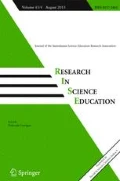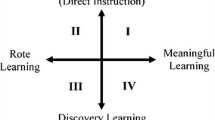Abstract
This paper describes the methods and outcomes of a 12-year longitudinal study into the effects of an early intervention program, while reflecting back on changes that have occurred in approaches to research, learning and instruction since the preliminary inception stages of the study in the mid 1960s. We began the study to challenge the prevailing consensus at the time that primary school children were either preoperational or concrete operational in their cognitive development and they could not learn abstract concepts. Our early research, based on Ausubelian theory, suggested otherwise. The paper describes the development and implementation of a Grade 1–2 audio tutorial science instructional sequence, and the subsequent tracing over 12 years, of the children’s conceptual understandings in science compared to a matched control group. During the study the concept map was developed as a new tool to trace children’s conceptual development. We found that students in the instruction group far outperformed their non-instructed counterparts, and this difference increased as they progressed through middle and high school. The data clearly support the earlier introduction of science instruction on basic science concepts, such as the particulate nature of matter, energy and energy transformations. The data suggest that national curriculum standards for science grossly underestimate the learning capabilities of primary-grade children. The study has helped to lay a foundation for guided instruction using computers and concept mapping that may help both teachers and students become more proficient in understanding science.
Similar content being viewed by others
References
American Association for the Advancement of Science. (1993). Benchmarks for science literacy. New York: Oxford University Press.
American Association for the Advancement of Science (2000). Atlas of science literacy. Washington, DC: National Academy Press.
Ausubel, D. P. (1963). The psychology of meaningful verbal learning. New York: Grune & Stratton.
Ausubel, D. P. (1968). Educational psychology: A cognitive view. New York: Holt, Rinehart & Winston.
Bretz, S. (1994). Learning strategies and their influence upon students’ conceptions of science literacy and meaningful learning. Unpublished doctoral dissertation, Cornell University, Ithaca, NY.
Chang, T. (1995). Ph.D. students’ epistemological commitments and their knowledge construction. Proceedings of the National Science Council, 5(1), 103–121.
Carey, S. (1985). Conceptual change in childhood. Cambridge, MA: MIT Press.
Chi, M. T. H. (1983). Network representation of a child’s dinosaur knowledge. Developmental Psychology, 19(1), 29–39.
Edmondson, K. M., & Novak, J. D. (1993). The interplay of scientific epistemological views, learning strategies, and attitudes of college students. Journal of Research in Science Teaching, 32(6), 547–559.
Edwards, J., & Fraser, K. (1983). Concept maps as reflectors of conceptual understanding. Research in Science Education, 13, 19–26.
Flavell, J. H. (1985). Cognitive development (2nd ed.). Englewood Cliffs, NJ: Prentice-Hall.
Jonassen, D. H., Beissner, K., & Yacci, M. (1993). Structural knowledge: Techniques for representing, conveying, and acquiring structural knowledge. Hillsdale, NJ: Erlbaum.
Kankkunen, M. (2001). Concept mapping and Peirce’s semiotic paradigm meeting in the elementary classroom environment. Learning Environment Research, 4(3), 287–324.
Kuhn, T. S. (1962). The structure of scientific revolutions. Chicago: University of Chicago Press.
National Research Council. (1996). National science education standards. Washington, DC: National Academy Press.
Novak, J. D. (1964). Importance of conceptual schemes for science teaching. The Science Teacher, 31(6), 10–14.
Novak, J. D. (1977a). A theory of education. Ithaca, NY: Cornell University Press.
Novak, J. D. (1977b). Epicycles and the homocentric earth: Or what is wrong with stages of cognitive development? Science Education, 61(3), 393–395.
Novak, J. D. (1982). Psychological and epistemological alternatives to Piagetian developmental psychology with support from empirical studies in science education. In S. Modgil, & C. Modgil (Eds.), Jean Piaget – Consensus and controversy (pp. 331–349). New York: Praeger.
Novak, J. D. (1993). Human constructivism: A unification of psychological and epistemological phenomena in meaning making. International Journal of Personal Construct Psychology, 6, 167–193.
Novak, J. D. (1998). Learning, creating, and using knowledge: Concept maps as facilitative tools in schools and corporations. Mahwah, NJ: Erlbaum.
Novak, J. D. (2002). Meaningful learning: The essential factor for conceptual change in limited or appropriate propositional hierarchies (LIPHs) leading to empowerment of learners. Science Education, 86(4), 548–571.
Novak, J. D. (2003). The promise of new ideas and new technology for improving teaching and learning. Journal of Cell Biology Education, 2, 122–132.
Novak, J. D., & Gowin, D. B. (1984). Learning how to learn. New York: Cambridge University Press.
Novak, J. D., & Musonda, D. (1991). A twelve-year longitudinal study of science concept learning. American Educational Research Journal, 28(1), 117–153.
Novak, J. D., Meister, M., Knox, W. W., & Sullivan, D. W. (1966). The world of science series. (Books 1–6). Indianapolis, IN: Bobbs-Merrill.
Nussbaum, J., & Novak, J. D. (1976). An assessment of children’s concepts of the earth utilizing structured interviews. Science Education, 60(4), 535–550.
O’Donnell, A. M., Dansereau, D. F., & Hall, R. H. (2002). Knowledge maps as scaffolds for cognitive processing. Educational Psychology Review, 14(1), 71–86.
Qin, Z., Johnson, D. W., & Johnson, R. T. (1995). Cooperative versus competitive efforts and problem solving. Review of Educational Research, 65(2), 129–143.
Ruiz-Primo, M. A., & Shavelson, R. J. (1996). Problems and issues in the use of concept maps in science assessment. Journal of Research in Science Teaching, 33(6), 569–600.
Sandoval, W. A., & Morrison, K. (2003). High school students ideas about theories and theory change after a biology inquiry unit. Journal of Research in Science Teaching, 40(4), 369–392.
Shavelson, R. J., & Ruiz-Primo, M. A. (2000). On the psychometrics of assessing science understanding. In J. J. Mintzes, J. H. Wandersee, & J. D. Novak (Eds.), Assessing science understanding: A human constructivist view (pp. 303–341). San Diego, CA: Academic Press.
Toulmin, S. (1972). Human understanding: Vol. 1. The collective use and evolution of concepts. Princeton, NJ: Princeton University Press.
Vygotsky, L. S. (1978). Mind in society: The development of higher psychological processes (M. Cole, V. John-Steiner, S. Scribner, & E. Souberman, Trans. & Eds.). Cambridge, MA: Harvard University Press (Original work published 1928).
Author information
Authors and Affiliations
Rights and permissions
About this article
Cite this article
Novak, J.D. Results and Implications of a 12-Year Longitudinal Study of Science Concept Learning. Res Sci Educ 35, 23–40 (2005). https://doi.org/10.1007/s11165-004-3431-4
Issue Date:
DOI: https://doi.org/10.1007/s11165-004-3431-4




